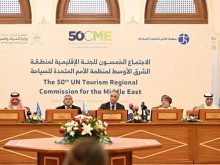 UN Tourism’s member states in the Middle East have looked to the future, coming together to focus on boosting investments into the sector and growing new products to build resilience and expand inclusivity. The Regional Commission for the Middle East welcomed high-level delegations from 13 Member States, including eight Ministers of Tourism. Welcoming delegates, UN Tourism Secretary-General invited all Members to join him in celebrating the Golden Jubilee of the Commission, noting that, over the course of 50 meetings, they have worked together to grow tourism both in size and in impact right across the region.
UN Tourism’s member states in the Middle East have looked to the future, coming together to focus on boosting investments into the sector and growing new products to build resilience and expand inclusivity. The Regional Commission for the Middle East welcomed high-level delegations from 13 Member States, including eight Ministers of Tourism. Welcoming delegates, UN Tourism Secretary-General invited all Members to join him in celebrating the Golden Jubilee of the Commission, noting that, over the course of 50 meetings, they have worked together to grow tourism both in size and in impact right across the region.
Secretary-General Zurab Pololikashvili provided Members with an update on the Organization’s work since the Commission last met (Jordan, June 2023), with special attention to key priorities of tourism education, jobs and investments. Opening the meeting he said: “Now, we can confidently say that the Middle East is a true global tourism leader. Not just in terms of arrivals, but the region is influencing our sector’s development everywhere in the world. It is a hub of tourism innovation and education. And it is a leading investor, backing big ideas and ambitious projects with the power to transform tourism at every level.” Now, we can confidently say that the Middle East is a true global tourism leader. Not just in terms of arrivals, but the region is influencing our sector’s development everywhere in the world.
More diverse, more innovative tourism
Following the reports of the Secretary-General and the Regional Director for the Middle East, the focus switched to building a more diverse, resilient and innovative sector. Reflecting UN Tourism’s commitment to build resilience and create opportunities through diversification, the significant potential of wellness tourism for the region was made clear. So too was the growing importance of gastronomy tourism as a pillar of rural development and cultural heritage. In Muscat, Secretary-General Pololikashvili formally presented the Omani Minister of Tourism and Heritage with a brochure on Gastronomy Tourism in the Sultanate.
Also high on the agenda were education and investments. The Middle East has emerged as a leading hub of both. With UN Tourism, the Kingdom of Saudi Arabia is taking the lead in providing professional education and training to tens of thousands of tourism workers, including at the new Riyadh School of Hospitality. The region is also an investment hub, with 254 greenfield projects announced in the Middle East between 2018 and 2023, representing a total capital investment of USD 15.2 billion. Reflecting this, the second day of the Commission will feature a special Conference on “Investing in Tourism: Opportunities and Challenges for Sustainable Financing.”
In the build-up to the commission meeting, His Highness Sayyid Fahd bin Mahmoud Al-Said, Deputy Prime Minister of the Council of Ministers of Sultanate of Oman, held a special audience with the UN Tourism Secretary-General and with the Heads of delegations. His Excellency welcomed the opportunity to host the landmark 50th meeting of the Regional Commission, as well as its first since the rebranding of UNWTO to UN Tourism.
To conclude, Members agreed that the 51st Regional Commission for the Middle East will be held in Doha, Qatar, in 2025.
 Tourism Breaking News
Tourism Breaking News


